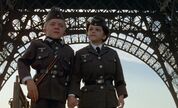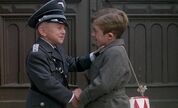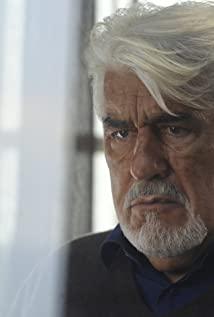As a film with a strong political color, the people and objects in the film have many metaphors and connections. Oscar in the film first appeared in the image of a passive rebel with certain abilities. He had memory and vision when he was born at the beginning, and even had certain thinking ability; at the same time, he was gifted, and his voice could Shattering glassware, these all illustrate the particularity of his identity. When he was three years old, his mother gave him a tin drum, and at the same time his life underwent a major change: he witnessed the hypocrisy and ugliness of the adult world, he witnessed the infidelity of his mother, so he chose to hide in Under his grandmother's skirt, his grandfather got under his grandmother's skirt to have his mother. The skirt can be said to be endowed with the meaning of life continuation. The goose that grandmother and mother used to make a living was also taken from under the skirt. come out. Oscar wanted to return to his mother's womb, shut the outside world out, and return to the original pure land, so he faked an accident and decided to stop growing up, so he really didn't grow up. The tin drum, which symbolized his "childhood" and purity, was always with him, and as a witness, he would scream if anyone tried to take it away. The setting of this scream has the meaning of "breaking" and "shattering", breaking the confinement of the glass. When he found out that his mother was having an affair with his uncle, he climbed to the highest clock tower and screamed to express his dissatisfaction and anger , screaming is one of his main means of resistance to the world. The other is the drum sound of the tin drum, which he beats in class to express his dissatisfaction with the rules of the world; his greatest masterpiece with the tin drum is to sit under the podium secretly, beat the rhythm with the tin drum, and turn a Nazi rally. It became a dance for the waltz of the Voice of Spring. In the face of the natural manifestation of human nature, the political propaganda seemed so vulnerable and satirized Nazi politics. But Oscar's conflict with the world has never been positive, and he has always adopted a strategy of avoiding the world. He did it when he was invited to a circus, and he did it when he was bullied.
At this time, Oscar still had hope for redemption. In the religious painting in the film, Jesus prayed in the same pose as Oscar's mother, and when he went to church later, Oscar hung the drum on the angel, wanting it to ring on his behalf, alerting the world and redeeming The original sin of human beings, but he was stopped. Religion failed to save Oscar and his mother who cared for him. He was completely disappointed.
Oscar's second transformation was brought about by Maria's arrival. Oscar's physical growth did not stop him from maturing. He had a good impression of Maria, who came to the store after his mother died, but Maria always He treats him as a child. The existence of the "Tin Drum", which symbolizes childhood and youth, hinders his communication with the world. After he finds out that his titular father, Alfred, is having an affair with Maria, he is angry and sad, and puts the tin drum Drum abandoned and climbed into the neighbor's bed. After bumping into the circus now for the Nazis again, he compromised and entered the circus, taking part in the war in an indirect way. The scream, once a symbol of rebellion, became a tool of pandering and pleasing after the change of stance, and Oscar sank. At the same time, he fell in love with a dwarf woman like him, established a love relationship with equal status, and found a soulmate in the circus. But all this short-lived goodness ended with Germany's fall in World War II, and Oscar returned to his home. At his father's funeral, he realized the deformity of this kind of life, so he decided to grow up. Taking a stone that hit his head as an opportunity, Oscar fell again. This time his fall symbolized the end of old life and the birth of new life. In his grave, he finally completed his rational return and started the process of growing up again.
In addition to the sober aspect of Oscar's character, he also retains the capricious and stubborn aspect of being a child. He is sometimes like a "depressed god" who unconsciously hurts those close to him: those who died because of his capriciousness. There was Uncle Bronski and the guy who helped him with the drums, Maria got pregnant because he was lying on top of Alfred, etc. There is both a childlike innocence and a cruel side to his character.
The setting of Oscar's morbid dwarf image reflects the unhealthy nature of the times and society at that time. Oscar's family relationship is chaotic, and he doesn't know who his father is from the beginning. According to Freud's theory: Father means authority in a person's life, and the role of father plays an extremely important role in the growth of an individual. The individual's self-affirmation is the result of successfully suppressing/defying the incestuous desire. This desire arises from the boy's antagonism and conflict with his father's authority in the process of self-identification, until the mother's choice one day stabilizes it and ensures the legitimacy of the intergenerational relationship. The long absence of Oscar's father, Bronski, and the dual physical and psychological softness of Poland as his symbol make it impossible for Oscar to play this authoritative role. As a representative of Germany, Alfred has a strong side, but he and Oscar's mother, Agnes, have been separated from each other, which has little effect on Oscar's growth; he knows that Agnes and Bronski are relationship, but acquiesced, acting like a "stepfather" to Oscar everywhere. It is precisely because of this fatherless state that Oscar's self-identification and definition are hindered, and his understanding of the relationship between ethics is unclear, so that he is resistant to authority and has a clear understanding of world affairs. In addition, the different flows and contaminations make him easy to compromise with temptation. The same thing happened to Agnes. Personally, Agnes was growing up with her father's long absence that made her sway between two men in the future: she fell in love with her cousin regardless of ethics, but she The infatuation with Alfred's strength is evidenced by kissing Alfred when the Nazis were strong; at the same time, since Agnes is the representative of Danzig, this also reflects Danzig's consciousness: because but The long-term uncertainty on the issue of the ownership of Zeze was once owned by Poland in name and as an autonomous prefecture, but economically dependent on Germany. Therefore, the fatherless state is also the unconscious normal state of the people of Danzig. Their numbness, selfishness and indifference are also one of the reasons why Oscar is disappointed with the world. The appearance of a seemingly powerful Nazi Germany can easily make its people have hope and goodwill towards this regime, so in the step-by-step propaganda of the Nazis, the people of Danzig fell step by step, and finally welcomed Hitler. But at the same time, as one commenter said, Hitler did not design himself as an ideal father figure, but as a son figure with a strong sense of responsibility of a loving mother, the Nazis' behavior was mature and less rational, with childish aggression Conscious and irrational. Therefore, the Nazis represented by Hitler are still essentially unworldly children. This can be seen from Alfred's tolerance and concession to Agnes, and finally Hitler's portrait was replaced. Therefore, the anxiety and confusion caused by the lack of identity was a common psychological reality and characteristic at that time. The result of rebellion against incest wishes. This desire arises from the boy's antagonism and conflict with his father's authority in the process of self-identification, until the mother's choice one day stabilizes it and ensures the legitimacy of the intergenerational relationship. The long absence of Oscar's father, Bronski, and the dual physical and psychological softness of Poland as his symbol make it impossible for Oscar to play this authoritative role. As a representative of Germany, Alfred has a strong side, but he and Oscar's mother, Agnes, have been separated from each other, which has little effect on Oscar's growth; he knows that Agnes and Bronski are relationship, but acquiesced, acting like a "stepfather" to Oscar everywhere. It is precisely because of this fatherless state that Oscar's self-identification and definition are hindered, and his understanding of the relationship between ethics is unclear, so that he is resistant to authority and has a clear understanding of world affairs. In addition, the different flows and contaminations make him easy to compromise with temptation. The same thing happened to Agnes. Personally, Agnes was growing up with her father's long absence that made her sway between two men in the future: she fell in love with her cousin regardless of ethics, but she The infatuation with Alfred's strength is evidenced by kissing Alfred when the Nazis were strong; at the same time, since Agnes is the representative of Danzig, this also reflects Danzig's consciousness: because but The long-term uncertainty on the issue of the ownership of Zeze was once owned by Poland in name and as an autonomous prefecture, but economically dependent on Germany. Therefore, the fatherless state is also the unconscious normal state of the people of Danzig. Their numbness, selfishness and indifference are also one of the reasons why Oscar is disappointed with the world. The appearance of a seemingly powerful Nazi Germany can easily make its people have hope and goodwill towards this regime, so in the step-by-step propaganda of the Nazis, the people of Danzig fell step by step, and finally welcomed Hitler. But at the same time, as one commenter said, Hitler did not design himself as an ideal father figure, but as a son figure with a strong sense of responsibility of a loving mother, the Nazis' behavior was mature and less rational, with childish aggression Conscious and irrational. Therefore, the Nazis represented by Hitler are still essentially unworldly children. This can be seen from Alfred's tolerance and concession to Agnes, and finally Hitler's portrait was replaced. Therefore, the anxiety and confusion caused by the lack of identity was a common psychological reality and characteristic at that time. The result of rebellion against incest wishes. This desire arises from the boy's antagonism and conflict with his father's authority in the process of self-identification, until the mother's choice one day stabilizes it and ensures the legitimacy of the intergenerational relationship. The long absence of Oscar's father, Bronski, and the dual physical and psychological softness of Poland as his symbol make it impossible for Oscar to play this authoritative role. As a representative of Germany, Alfred has a strong side, but he and Oscar's mother, Agnes, have been separated from each other, which has little effect on Oscar's growth; he knows that Agnes and Bronski are relationship, but acquiesced, acting like a "stepfather" to Oscar everywhere. It is precisely because of this fatherless state that Oscar's self-identification and definition are hindered, and his understanding of the relationship between ethics is unclear, so that he is resistant to authority and has a clear understanding of world affairs. In addition, the different flows and contaminations make him easy to compromise with temptation. The same thing happened to Agnes. Personally, Agnes was growing up with her father's long absence that made her sway between two men in the future: she fell in love with her cousin regardless of ethics, but she The infatuation with Alfred's strength is evidenced by kissing Alfred when the Nazis were strong; at the same time, since Agnes is the representative of Danzig, this also reflects Danzig's consciousness: because but The long-term uncertainty on the issue of the ownership of Zeze was once owned by Poland in name and as an autonomous prefecture, but economically dependent on Germany. Therefore, the fatherless state is also the unconscious normal state of the people of Danzig. Their numbness, selfishness and indifference are also one of the reasons why Oscar is disappointed with the world. The appearance of a seemingly powerful Nazi Germany can easily make its people have hope and goodwill towards this regime, so in the step-by-step propaganda of the Nazis, the people of Danzig fell step by step, and finally welcomed Hitler. But at the same time, as one commenter said, Hitler did not design himself as an ideal father figure, but as a son figure with a strong sense of responsibility of a loving mother, the Nazis' behavior was mature and less rational, with childish aggression Conscious and irrational. Therefore, the Nazis represented by Hitler are still essentially unworldly children. This can be seen from Alfred's tolerance and concession to Agnes, and finally Hitler's portrait was replaced. Therefore, the anxiety and confusion caused by the lack of identity was a common psychological reality and characteristic at that time. was replaced. Therefore, the anxiety and confusion caused by the lack of identity was a common psychological reality and characteristic at that time. was replaced. Therefore, the anxiety and confusion caused by the lack of identity was a common psychological reality and characteristic at that time.
From passive resistance to sinking to sobriety, Oscar has gone through a long road of growth. The film contains profound reflections on the times and nationality that caused the tragedy of World War II. At the end of the film, Oscar takes the train slowly to his new life. Like the beginning of the film, his grandmother is still sitting on the land of the origin of life. Time flies and things change, and only life will continue from generation to generation.
View more about The Tin Drum reviews











